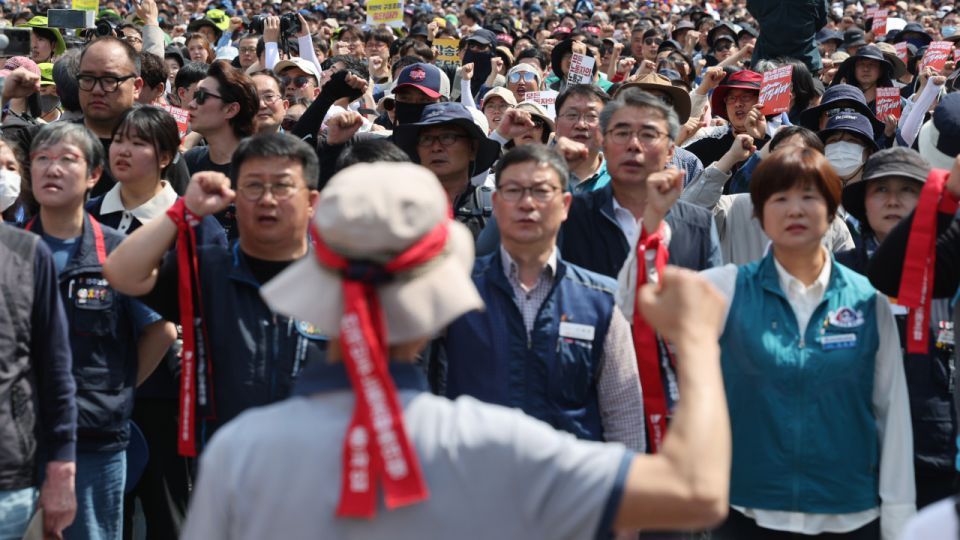May 2, 2024
SEOUL – Over 30,000 workers affiliated with the country’s two major umbrella labor unions held rallies in Seoul on Wednesday on International Workers’ Day, criticizing President Yoon Suk Yeol’s proposal to hire foreign domestic workers outside the minimum wage system.
Unionized workers described Yoon’s proposal addressed earlier this month as an attempt not only to discriminate against foreign workers but also to deny the application of the minimum wage system to a select group of people.
Earlier this month, Yoon proposed hiring foreign nationals as domestic workers as a way to cut costs for care labor in an attempt to address Korea’s declining birth rate. “The reality is that the current wage level of domestic helpers and caregivers is too burdensome for dual-income couples to bear,” Yoon said.
Hiring people of foreign nationality through contracts with individual households will enable them “not (to) be subject to the minimum wage system,” Yoon said in his public remarks. South Korea’s minimum wage stands at 9,860 won ($7.10) per hour.
Kim Dong-myeong, who leads the Federation of Korean Trade Unions, said discrimination against foreigners would “ignite discrimination against women, against the young generation, against the old generation, as well as discrimination based on a person’s place of origin,” before some 7,000 workers who gathered in front of the National Assembly in Yeouido, a financial district in western Seoul, at 2 p.m.
Kim added a discriminatory wage system could “create social stigma, and turn South Korea into a society where ‘every individual discriminates against each other.'”
Yang Kyung-soo, head of the Korean Confederation of Trade Unions, also called for a “fair working environment where no one is discriminated against due to nationality, race, gender, disability or type of employment,” before some 25,000 KCTU members gathered for a rally near Gwanghwamun Square, also at 2 p.m.
This followed the public remarks by Amrit Limbu, who identified himself as a Nepalese national working in Korea, that the Yoon administration is trying to “increase the number of migrant workers, deprive them of their rights, seek a discriminatory application of minimum wage system,” among others.
The two umbrella unions also called on the conservative government to ditch any repressive actions against labor unions, such as the union’s mandatory disclosures of their financial statements.
The KCTU blasted Yoon’s “union-busting attempts,” as well as his opposition to the expansion of the Serious Accident Punishment Act, which seeks criminal charges for business owners when there is a deadly accident in their workplace, over the past two years.
Protesters affiliated with the KCTU marched along the streets of central Seoul from multiple starting points: the Sejongdaero intersection, Euljiro and the Ministry of Employment and Labor Seoul Branch in Jung-gu, Seoul. The union group’s branches across the country also held rallies in their respective regions.
On the same day, Yoon, who has long advocated labor reform and a “rule of law” approach to dealing with unionized workers’ activities, pledged to create an environment in which the value of labor is cherished.
Yoon, commemorating May Day, thanked all 28.4 million workers for their contributions to South Korea’s “dazzling national economic growth.”
He added, “The precious value of labor must be protected. I will make a workplace safe and fair for every worker.”
Yoon has been at odds with the labor unions before, such as in late 2022 when he enforced a “back to work” order on cargo truckers who staged a walkout in protest against the government’s refusal to extend the application of the freight rate system in favor of the truckers.


